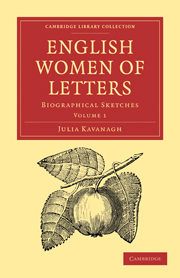Summary
Mrs. Charlotte Smith enjoyed a combination of powers which rarely fail to acquire for their owner a present reputation, and seldom secure a lasting fame. She knew how to tell a story, and make it interesting; she could sketch character with shrewdness and truth; she had feeling, and selected her affecting incidents with judgment; her eye for nature was true, and her descriptions were always fresh, vivid, and natural. But she possessed not one of these gifts in its fulness. It is not moderation, but excess that strikes the public, and even posterity. Miss Burney verged on caricature, yet she holds a far higher place than Mrs. Smith; Mrs. Radcliffe was natural in nothing, her terror, her landscapes, are utterly beyond all truth, yet she can still charm the imagination and win forgiveness for her sins. It is Mrs. Smith's fault that she has none, and yet is not perfect. Her best stories are tinged with a sort of mediocrity, which often looks like the effect of haste, and suggests that her powers were never fairly developed. It is hard to think that she who kept so clear from romantic folly and worldly coldness, who could paint pleasing and natural characters, and sketch such fresh and charming landscapes, could not have done better under more favourable circumstances. Even as it is, the place she holds in English literature is worthy of a record.
- Type
- Chapter
- Information
- English Women of LettersBiographical Sketches, pp. 194 - 234Publisher: Cambridge University PressPrint publication year: 2010First published in: 1863

